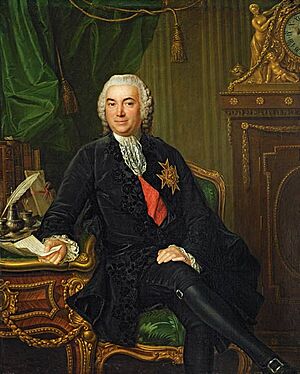Joseph Foullon de Doué facts for kids
Quick facts for kids
Joseph-François Foullon
|
|
|---|---|
 |
|
| Controller-General of Finances | |
| In office 12 July 1789 – 22 July 1789 |
|
| Monarch | Louis XVI |
| Preceded by | Jacques Necker |
| Succeeded by | Claude Guillaume Lambert |
| Personal details | |
| Born | 25 June 1715 Saumur, France |
| Died | 22 July 1789 (aged 74) Place de Grève, Paris, France |
Joseph-François Foullon de Doué (born June 25, 1715 – died July 22, 1789) was an important French politician. He served as a top finance official for Louis XVI, the King of France, just before the French Revolution.
Early Career and Public Opinion
Foullon was born in Saumur, France. He held several important jobs for the French government. During the Seven Years' War, he was like a chief manager for the armies. He made sure they had everything they needed. Later, he managed money matters for the king as an "Intendant of Finances."
In 1789, a time of great change in France, the king's finance minister, Jacques Necker, was fired. Foullon was then chosen to take over as the Controller-General of Finances. This job was similar to being the main finance minister.
However, Foullon was not very popular with people. Some tax collectors didn't like him because he was strict. Many Parisians, especially the poor, thought he was too rich. They believed he got his wealth by taking advantage of them. There was even a rumor that he once said: "If those rascals have no bread, then let them eat hay." This made people even angrier. He was also a strong supporter of the old ways and disliked certain powerful groups, like those connected to Louis Philippe II, Duke of Orléans.
Foullon was also a member of the Parlement of Paris. This was a high court in France just before the French Revolution began.
Capture and Death
After the storming of the Bastille on July 14, 1789, Paris became a very dangerous place for people like Foullon. He quickly left the city and went to stay at a friend's house a few miles away. He even tried to spread rumors that he had died to avoid being found.
But on July 22, Foullon was captured by angry peasants. They forced him to walk barefoot all the way to the Hôtel de Ville (City Hall) in Paris. Along the way, they tied a bundle of hay to his back. They also made him drink peppered vinegar and wiped his face with stinging nettles.
In Paris, important leaders like Jean Sylvain Bailly and the Marquis de La Fayette tried to help him. But the angry crowd was too strong. Foullon was dragged to the Place de Grève, a public square, where he was killed by the mob.
His death is mentioned in famous books. Charles Dickens wrote about it in his novel A Tale of Two Cities. It is also discussed by Thomas Paine in his book Rights of Man (1791). Paine used Foullon's story to show how the harsh actions of the old French rulers might have led to the violence of the revolution.
Images for kids
 | Laphonza Butler |
 | Daisy Bates |
 | Elizabeth Piper Ensley |


